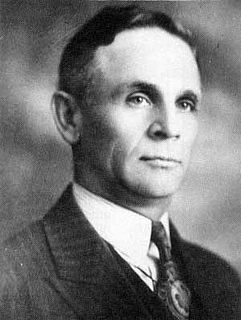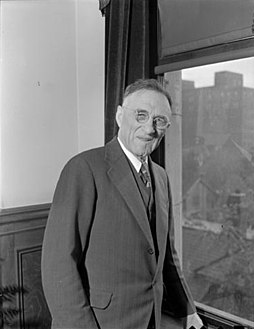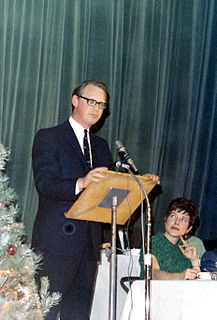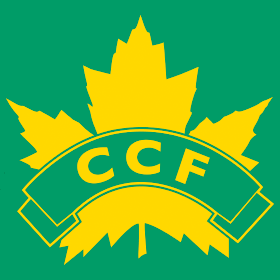| Date | December 9, 1938 |
|---|---|
| Convention | Royal York Hotel, Toronto |
| Resigning leader | Earl Rowe |
| Won by | George Drew |
| Ballots | 1 |
| Candidates | 4 |
A Conservative Party of Ontario leadership election (formally the convention of the Liberal-Conservative Association of Ontario) was on December 9, 1938 at the Royal York Hotel in Toronto to replace retiring Conservative leader Earl Rowe, who had resigned after his party lost the 1937 provincial election to Mitchell Hepburn's Liberals.
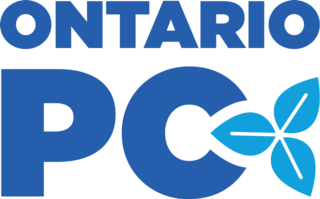
The Progressive Conservative Party of Ontario, often shortened to Ontario PC Party, PC, or Conservatives, is a centre-right political party in Ontario, Canada. The party has been led by Premier Doug Ford since March 10, 2018.

The Fairmont Royal York, formerly and commonly known as the Royal York, is a large historic luxury hotel in Toronto, Ontario, Canada. Located along Front Street West, the hotel is situated at the southern end of the Financial District, in Downtown Toronto. The Royal York was designed by Ross and Macdonald, in association with Sproatt and Rolph, and built by the Canadian Pacific Railway company. The hotel is presently managed by Fairmont Hotels and Resorts.

Toronto is the provincial capital of Ontario and the most populous city in Canada, with a population of 2,731,571 in 2016. Current to 2016, the Toronto census metropolitan area (CMA), of which the majority is within the Greater Toronto Area (GTA), held a population of 5,928,040, making it Canada's most populous CMA. Toronto is the anchor of an urban agglomeration, known as the Golden Horseshoe in Southern Ontario, located on the northwestern shore of Lake Ontario. A global city, Toronto is a centre of business, finance, arts, and culture, and is recognized as one of the most multicultural and cosmopolitan cities in the world.
Colonel George A. Drew was considered the front-runner leading into the convention and stared down a challenge by "old guard" candidate Earl Lawson, a former MP, who had declared his candidacy the week prior to the convention. Drew's candidacy was considered controversial by some Conservatives as he had quit the party and run as an Independent Conservative in the 1937 provincial election in protest of the pro-labour stance of leader Earl Rowe during the Ontario government's conflict with the Congress of Industrial Organizations in Oshawa.

George Alexander Drew, was a Canadian conservative politician who founded a Progressive Conservative dynasty in Ontario that lasted 42 years. He served as the 14th Premier of Ontario from 1943 to 1948.
James Earl Lawson, was a Canadian politician and lawyer.

The Congress of Industrial Organizations (CIO) was a federation of unions that organized workers in industrial unions in the United States and Canada from 1935 to 1955. Created in 1935 by John L. Lewis, who was a part of the United Mine Workers (UMW), it was originally called the Committee for Industrial Organization but changed its name in 1938 when it broke away from the American Federation of Labor. It also changed names because it was not successful with organizing unskilled workers with the AFL.
First ballot:
- DREW, George 796
- LAWSON, Earl 413
- HEIGHINGTON, Wilfrid 41
- RAWSON, Norman 22

Wilfrid Laurier Heighington, was a Canadian soldier, writer, lawyer and politician.
Reverend Norman Rawson was a World War I veteran, attaining the rank of captain, and minister at Centenary Church in Hamilton, Ontario from 1937 until 1954. In 1938, he was a candidate in the 1938 Conservative Party of Ontario leadership convention receiving 22 votes and coming in last of four candidates behind the winner, George Drew. He subsequently became a speaker for the Leadership League, a conservative movement established by The Globe and Mailpublisher George McCullagh which proposed one party rule in Canada under direction of business leaders.
See also: Progressive Conservative Party of Ontario leadership conventions


